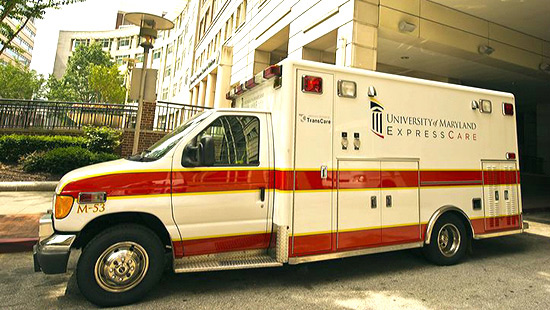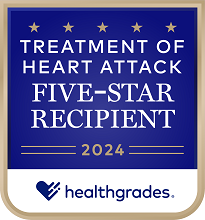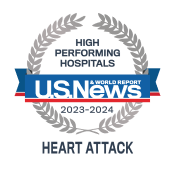Heart Attack

Heart attacks are the result of a blockage of blood flow to the heart through the coronary artery.
Symptoms include pain in the chest and surrounding areas, difficulty breathing, fatigue and lightheadedness.
A heart attack is a medical emergency and requires immediate care.
At the UM Capital Heart and Vascular Institute, our Chest Pain Center (CPC) team specializes in recognizing and treating heart attacks quickly, when every moment counts.
If you believe that you or a loved one is having a heart attack, call 911 immediately.
Heart Attack Symptoms
- Discomfort or heaviness in chest, arm or below the breastbone
- Discomfort in your back, jaw, throat or arm
- A feeling of heartburn
- Sweating, nausea or vomiting
- Weakness
- Shortness of breath
- Irregular heartbeat
Heart attack symptoms can be different for men and women, so it’s important to be aware of what to look for:
- Men normally feel pain and numbness in the left arm or on the left side of the body, but women may experience pain on the right side.
- Women are more likely to feel symptoms such as exhaustion, nausea, stomach pain (often confused with heartburn), or upper-back pain that travels up to their jaw.
If you or someone you are with is experiencing these symptoms, call 911 to get care as quickly and safely as possible.
Treating Heart Attacks at UM Capital Region Health
As a designated Chest Pain Center, our emergency services team is notified when emergency responders’ initial exam indicates someone has had a heart attack. This allows our care team members to prepare for your arrival and provide immediate care when you arrive. Our experienced Chest Pain Center team has specialized training to identify and treat the most dangerous type of heart attack: when there’s a complete blockage of a blood vessel to the heart.
This highly coordinated process among emergency responders, ambulance services, emergency doctors and heart and vascular experts allows us to provide care in the early stages of a heart attack when treatment is most effective. Our experience and team approach mean we can offer you the very best care, close to home.
Heart Attack Prevention
You can take steps to prevent a heart attack, including lifestyle changes and consulting with your primary care physician. Should you need coronary bypass surgery, our heart surgery team ranks in the top 10% nationally in performing this operation.
Call our cardiac rehab specialists at 240-677-2150 to learn more about our preventative programs and to learn about our cardiac rehab program for those recovering after a heart attack.
Heart attack risk factors include:
- Chest pain, pressure, burning, aching or tightness – it may come and go
- A family history of cardiovascular disease
- High blood pressure
- Overweight or obesity
- Sedentary lifestyle
- Using tobacco products
- Metabolic disease, diabetes or illnesses
- For women it can also include birth control pills, a history of preeclampsia, gestational diabetes or having a low birth weight baby


